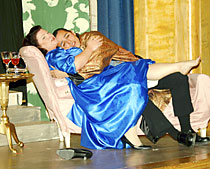This weekend, Dyker Heights will bear witness
to stumbling drunkenness, deceit and other sordid behavior in
Regina Opera’s production of Johann Strauss’ "Die Fledermaus."
And veteran director Linda Lehr knows how to manipulate her audiences
to elicit maximum laughs.
"Your main job is to tell the story," Lehr told GO
Brooklyn about crafting her latest production. "When you
direct any operatic work, you listen to the music and go through
the libretto, but the bottom line is to take the audience from
point A to point B. That’s most important in ’Die Fledermaus,’
which is a comedy. The jokes must always be clear, along with
the relationships. You can’t just willy-nilly throw stuff onstage
if it does not clarify what’s happening in the story."
And that story is one of the most convoluted "mistaken identity"
plots in all of operatic history. Opera singer Rosalinda, whose
husband Gabriel is set to go to prison, is being wooed by Alfred,
a former suitor. After Gabriel leaves the house (to attend a
party on his last night of freedom), Alfred arrives for a tete-a-tete
with Rosalinda and is soon arrested by the police, who think
he’s Gabriel. Rosalinda later goes to the same party in disguise,
and her husband begins flirting with her, thinking she’s another
woman.
Needless to say, by the time the operetta ends, all’s well that
ends well. But for Lehr, staging operettas is more difficult
than standard operas.
"’Die Fledermaus’ is one of two operettas we do [the other
is ’The Merry Widow’]," explains the director. "We
usually do standard Italian operatic repertoire, and there is
a big difference between an opera and an operetta.
"Operetta is much harder to direct because there are more
disparate elements to put together: there’s not as much technical
complexity in an operetta as an opera, but in an operetta there’s
a lot of spoken dialogue, which makes it more like a play. And
there’s a lot more dancing than in standard operas," she
continues.
Lehr makes it clear that, difficulties notwithstanding, developing
this version of Strauss’ beloved Viennese musical work has been
a pleasure, due to her capable cast.
"I’ve been very fortunate for this production to have both
of our casts, who are willing and able to do what they have to,
to do what opera singers usually don’t do," she says. (Regina
Opera double-casts its productions, with each cast alternating
performances.) "I have a great respect for singers. What
they do – produce a powerful vocal sound over a loud orchestra
– is physically very difficult."
New maestro
For "Fledermaus," Lehr worked closely with 31-year-old
conductor Carmine Aufiero, who is making his Regina Opera podium
debut this weekend.
"I met with Carmine and we went through the entire score,"
says Lehr. "I get from him what he’s looking for musically,
which helps me to pre-plan everything that I’ll be doing onstage."
For his part, Aufiero, who is music director of Chelsea Opera
in Manhattan, sees the whole enterprise beginning with the music.
"My first priority is to make sure that the singers feel
comfortable, because for me, their singing and their characterizations
are the most important," the conductor explains. "If
we take it musically step-by-step, then it all falls into place.
I like to approach any well-known work as if it were the first
time we’re hearing it; I want to make it as fresh as possible."
Part of that freshness is dealing honestly with the most recognizable
parts of the score: "The famous ensembles, while difficult
to put together, are kind of stimulating to do," he continues.
"When you hear this music live during the rehearsals, it’s
exciting for everyone."
Lehr seconds that notion, explaining how she stages the most
famous "Fledermaus" sequences.
"You want to give [the audience] what they want," she
admits. "Take the ensemble, ’The Thing to Love’ – I’m keeping
the staging relatively static. If there’s too much movement,
it will become confusing. You want to bask in that glorious ensemble,
so I’ll have the lighting go up and down on each couple as they
sing.
"We’ll also include a Regina Opera tradition: we throw a
spotlight on the large mirror ball and the whole auditorium becomes
drenched in its light," she says about the set innovation
that’s comically apropos for an opera company in close proximity
to the locations of the classic disco flick, "Saturday Night
Fever."
A long-standing Regina Opera veteran, Lehr is committed to maintaining
the company’s high standards.
"We do have a very informed audience," says Lehr. "From
one-third to two-thirds of our audience knows how to speak Italian,
so when we’re doing the standard Italian operas, we can do subtle
things that they will always pick up on.
"It’s a joy to direct here because the audience is knowledgeable
and the producers are very supportive."
Regina Opera presents "Die Fledermaus"
on Nov. 19 and 26 at 7 pm and Nov. 20 and 27 at 4 pm at Regina
Hall, on the corner of 12th Avenue and 65th Street in Dyker Heights.
Tickets are $17; $12 college students and seniors; $5 high school
students; free for children. For more information, call (718)
232-3555 or visit www.reginaopera.org
on the Web.

























